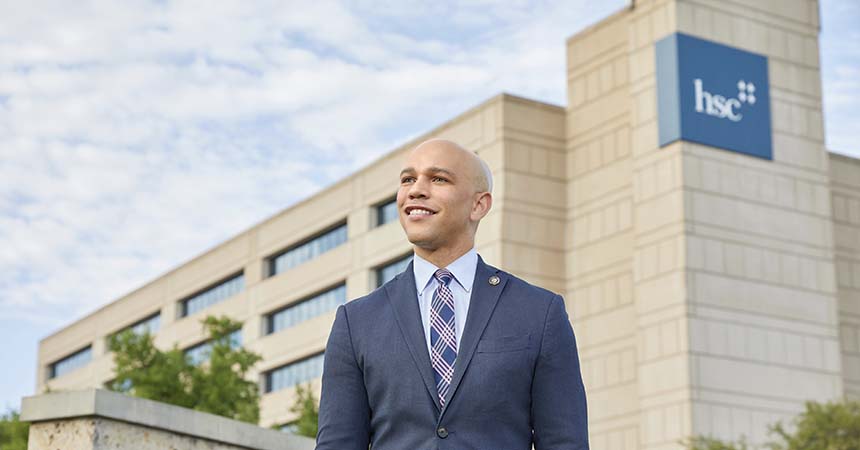MHA Program Director Dr. Stephan Davis contributes to national diversity, equity and inclusion report
The Josiah Macy Jr. Foundation, with contributions from the HSC School of Public Health, has released a set of recommendations for building a culture of fairness, respect and inclusion in health professions learning environments.
SPH Assistant Professor and MHA Program Director Stephan Davis, DNP, MHSA, FACHE, contributed to the Foundation’s report and development of four broad recommendations and specific action steps for addressing forms of harmful bias and eliminating discrimination, to make diversity, equity and inclusion top priorities in learning environments and in practice.
Dr. Davis is a recognized nursing leader, healthcare executive and educator who is active in a number of national organizations, including serving as Chair for the American College of Healthcare Executives (ACHE) LGBTQ Forum. He also serves as Co-Chair of the Equity, Diversity and Inclusion (EDI) Committee for the School of Public Health.
The Macy Foundation is dedicated solely to improving health professions education, based on the principle that these fields have at their core a strong social mission to serve the public’s needs and improve health.
“HSC is committed to promoting an understanding of diversity, equity and inclusion,” Dr. Davis said. “We are working together across campus and in partnership with other organizations to equip the public health and health professionals of tomorrow as they prepare to meet the needs of a dynamic global society.”
The Macy Foundation report and recommendations were initiated at the organization’s 2020 conference earlier this year, with input from more than 40 faculty, student and leadership representatives of medical and nursing schools and universities like HSC. Dr. Davis represented the HSC School of Public Health and MHA program. The report was revised and refined in recent months and formally released in September.
“Preparing future health and public health professionals for their important roles in society involves both curriculum and crucial conversations focusing on the ways that racism and other forms of bias can harm people’s health, influence decisions that perpetuate inequities and threaten lives,” Dr. Davis said.
“We have seen the devastating impacts of health inequity and social injustice unfold in tragic, unimaginable ways this year within Black communities, bringing national focus to the need for solutions. It’s time.”
Seeking to eliminate harmful bias and discrimination in the classroom and addressing ways that these issues manifest in professional and clinical environments, contributors to the Macy Foundation report developed four recommendations for the nation’s medical, nursing and health professions schools:
- Build an institutional culture of fairness, respect and anti-racism by making diversity, equity and inclusion top priorities.
- Develop, assess and improve systems to mitigate harmful biases and eliminate racism and all other forms of discrimination.
- Integrate equity into health professions curricula, explicitly aiming to mitigate the harmful effects of bias, exclusion, discrimination, racism and all other forms of oppression.
- Increase the numbers of health professions students, trainees, faculty and institutional administrators and leaders from historically marginalized and excluded populations.
Aligned with HSC’s campus-wide commitment to Diversity, Equity and Inclusion, the School of Public Health’s EDI committee is already working on initiatives corresponding to the Macy Foundation recommendations and action steps.
Read more about the Macy Foundation report here.




![Uyen Sa Nguyen Scaled[58]](https://www.unthsc.edu/newsroom/wp-content/uploads/sites/16/Uyen-Sa-Nguyen-scaled58-145x175.jpg)

Social media